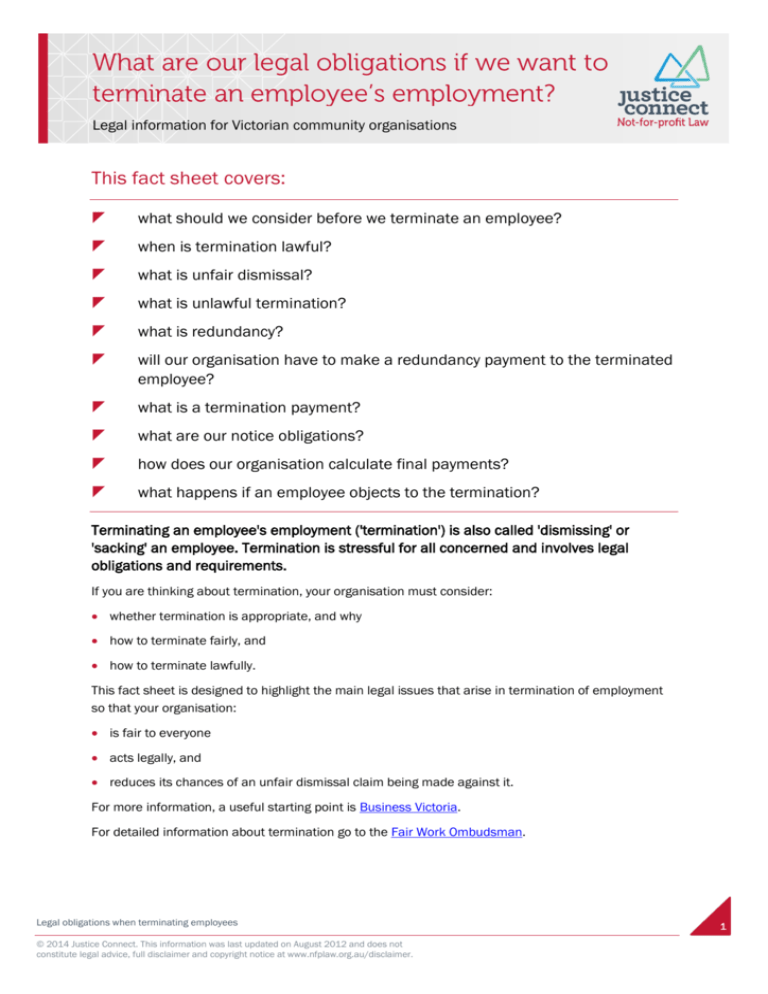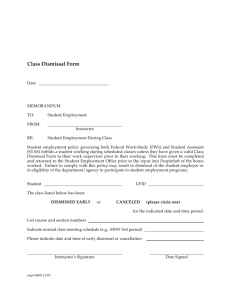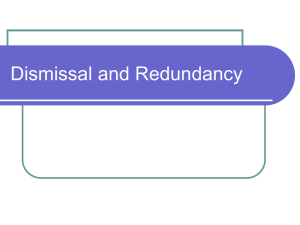
Legal information for Victorian community organisations
This fact sheet covers:
what should we consider before we terminate an employee?
when is termination lawful?
what is unfair dismissal?
what is unlawful termination?
what is redundancy?
will our organisation have to make a redundancy payment to the terminated
employee?
what is a termination payment?
what are our notice obligations?
how does our organisation calculate final payments?
what happens if an employee objects to the termination?
Terminating an employee's employment ('termination') is also called 'dismissing' or
'sacking' an employee. Termination is stressful for all concerned and involves legal
obligations and requirements.
If you are thinking about termination, your organisation must consider:
whether termination is appropriate, and why
how to terminate fairly, and
how to terminate lawfully.
This fact sheet is designed to highlight the main legal issues that arise in termination of employment
so that your organisation:
is fair to everyone
acts legally, and
reduces its chances of an unfair dismissal claim being made against it.
For more information, a useful starting point is Business Victoria.
For detailed information about termination go to the Fair Work Ombudsman.
Legal obligations when terminating employees
© 2014 Justice Connect. This information was last updated on August 2012 and does not
constitute legal advice, full disclaimer and copyright notice at www.nfplaw.org.au/disclaimer.
1
Sometimes an employer will terminate an employee for:
poor performance
misconduct
putting another worker in danger
refusing to follow instructions, or
where there is no longer a need for the position.
It is lawful for an employer to terminate an employee if:
there is a genuine need for redundancy (see below under 'What is redundancy?')
it would not be considered harsh, unjust or unreasonable, or
your organisation is a small business and the dismissal is consistent with the Small Business Fair
Dismissal Code.
All employees must be given:
a chance to reach the appropriate work standards, and
a fair hearing. Make sure your organisation has a clear policy that sets out clear procedures for
discipline and dismissal, that your employees are aware of these and that you follow them.
Go to Business Victoria's Online Tools for a template HR Manual on discipline and misconduct.
Employees must be given fair warning to improve their performance and help if required (like training
or mentoring) before termination, but a 'three-strikes policy' isn't a legal requirement.
If an employee has committed gross (serious) misconduct you don't have to give them warnings and
they can be instantly (summarily) dismissed.
An employee can be summarily dismissed for serious misconduct. Theft, fraud, assault, being drunk,
or refusing to carry out reasonable instructions have all been found to be serious misconduct at times.
Warning!
Serious misconduct can justify summary dismissal but an employee must always be given a fair
hearing about the circumstances surrounding an incident before termination.
You'll need to check whether instant dismissal affects the employee's final payments (sometimes you
don't have to pay their notice, for example).
Legal obligations when terminating employees
© 2014 Justice Connect. This information was last updated on August 2012 and does not
constitute legal advice, full disclaimer and copyright notice at www.nfplaw.org.au/disclaimer.
2
Unfair dismissal occurs when an employee has been dismissed, applies to the Fair Work Commission
and the Fair Work Commission finds that:
they were dismissed
the dismissal was harsh, unjust or unreasonable, and
the dismissal was not a case of genuine redundancy. When the Fair Work Commission decides if a
dismissal was harsh, unjust or unreasonable, they consider:
if there's a valid reason for the dismissal
if the employee was notified about the reason and allowed to respond, and
if the dismissal was for unsatisfactory performance, whether the employee was warned about their
performance before the dismissal.
Your organisation should seek legal advice before you dismiss an employee.
The Fair Work Commission won't find that unfair dismissal has occurred if your organisation is a small
business employer and followed the Small Business Fair Dismissal Code.
For more information on the Small Business Fair Dismissal Code, go to the Fair Work
Commission checklist which is designed to help organisations comply with the Code.
For more detailed information on unfair dismissal go to the Fair Work Ombudsman.
Unlawful termination is different from unfair dismissal because it only arises where the termination
occurred for a discriminatory reason, or was against the law.
The Fair Work Ombudsman deals with unlawful termination issues and may seek penalties against an
employer for breach of the Fair Work Act 2009 (Cth).
So make sure that you have legal advice before you dismiss an employee.
For more information go to the Fair Work Ombudsman's information on unlawful termination and
discrimination..
If your organisation has 15 or more employees and dismisses an employee (who has been working for
your organisation for at least one year) because it:
no longer requires that employee's job to be done by anyone, or
has become insolvent or bankrupt
then your organisation can make that employee redundant and terminate their employment.
Legal obligations when terminating employees
© 2014 Justice Connect. This information was last updated on August 2012 and does not
constitute legal advice, full disclaimer and copyright notice at www.nfplaw.org.au/disclaimer.
3
The law focuses on whether a redundancy is genuine or not. A redundancy will not be an unfair
dismissal if it is genuine. A genuine redundancy occurs where:
the organisation no longer needs the job to be done because of changes in operational
requirements, and
the organisation follows the consultation requirements in the award, agreement or industrial
instrument that applies.
A redundancy is not genuine if:
the operational requirements of the organisation have not changed and your organisation still
needs the employee's job to be done by someone
it would have been reasonable in the circumstances for the employee to be redeployed within the
organisation or an associated entity, and
your organisation has not followed requirements under the applicable award, agreement or
contract to consult with the employee about the redundancy.
This is a complex area so you may need legal advice. For information go to the Fair Work Ombudsman.
Will our organisation have to make a redundancy payment to the terminated employee?
Redundancy occurs when an organisation has 15 or more employees and dismisses an employee
(who has been working for your organisation for at least one year) because it:
no longer requires that employee's job to be done by anyone, or
has become insolvent or bankrupt.
A redundancy will not be considered an unfair dismissal of an employee if it is genuine. A genuine
redundancy occurs where:
the organisation no longer needs the job to be done because of changes in operational
requirements, and
the organisation follows the consultation requirements in the award, agreement or industrial
instrument that applies.
A redundancy is not genuine if:
the operational requirements of the organisation have not changed and the organisation still needs
the employee's job to be done by someone
it would have been reasonable in the circumstances for the employee to be redeployed within the
organisation or an associated entity, or
the organisation did not follow requirements under the applicable award, agreement or contract to
consult with the employee about the redundancy.
This is a complex area so if your organisation is considering making an employee redundant you
should seek legal advice to ensure no unfair dismissal claim is made against you.
For more information go to the Fair Work Ombudsman..
Legal obligations when terminating employees
© 2014 Justice Connect. This information was last updated on August 2012 and does not
constitute legal advice, full disclaimer and copyright notice at www.nfplaw.org.au/disclaimer.
4
Your employee is entitled to something called a 'termination payment' and this is prescribed under
state and federal law, and their award, agreement and/or contract.
An employee may, for example, be entitled upon the termination of their employment to unused
holiday pay, wages owing, and pro-rata long service leave. Check how much your employee is owed
with the Fair Work Ombudsman to make sure you get it right.
Notice obligations to a terminated employee vary, but most full-time and part-time employees are
entitled to some notice prior to termination. If you are terminating a casual employee then usually
there are no notice requirements.
If your employee is covered by a modern award or enterprise agreement or has a written contract of
employment, that award, agreement or contract may specify a period of notice that you must comply
with.
For more information, go to the Fair Work Ombudsman.
To calculate the final payments you owe a terminated employee check the award, agreement or
contract that applies and call the Fair Work Ombudsman to confirm.
It is typical for an accurate final payment to include:
unused annual leave
'payment in lieu' if the employee is not going to work through the normal notice period to their
official last day (but remember to calculate the employee's superannuation to the end of the notice
period)
pro-rata long service leave, usually only after seven years' service (10 years in some awards
containing their own long service leave provisions). The online long service leave calculator on the
Business Victoria website can help you calculate this.
Special tax rules apply to some termination payments e.g. unused annual leave and sometimes you
will be exempt from certain payments where termination is for serious misconduct.
Check with the Fair Work Ombudsman and the Tax Office or your tax adviser to make sure you are
correct.
Legal obligations when terminating employees
© 2014 Justice Connect. This information was last updated on August 2012 and does not
constitute legal advice, full disclaimer and copyright notice at www.nfplaw.org.au/disclaimer.
5
If an employee objects to their termination they can complain to the Fair Work Commission.
If the Fair Work Commission decides that your organisation has dismissed the employee for an
unlawful reason or the termination was 'harsh, unjust or unreasonable', the employee may
successfully have made out that unlawful termination or unfair dismissal against your organisation.
For more information on the steps an employee might follow if they feel they have been unfairly
dismissed, go to the Fair Work Commission.
Legal obligations when terminating employees
© 2014 Justice Connect. This information was last updated on August 2012 and does not
constitute legal advice, full disclaimer and copyright notice at www.nfplaw.org.au/disclaimer.
6
Related Not-for-profit Law Resources
The Not-for-profit Law Information Hub (www.nfplaw.org.au) has lots of information for not-for-profits
about the relationship with their employees
Employees
Changing or ending an organisation
Other Related Resources
Business Victoria - Ending employment
Fair Work Commission
Fair Work Ombudsman
A Not-for-profit Law Information Hub resource. Access more resources at www.nfplaw.org.au
© 2014 Justice Connect. You may download, display, print and reproduce this material for your personal use, or
non-commercial use within your not-for-profit organisation, so long as you attribute Justice Connect as author and
retain this and other copyright notices. You may not modify this resource. Apart from any use permitted under the
Copyright Act 1968 (Cth), all other rights are reserved.
To request permission from Justice Connect to use this material, contact Justice Connect at PO Box 16013,
Collins Street West, Melbourne 8007, or email nfplaw@justiceconnect.org.au
Legal obligations when terminating employees
© 2014 Justice Connect. This information was last updated on August 2012 and does not
constitute legal advice, full disclaimer and copyright notice at www.nfplaw.org.au/disclaimer.
7







